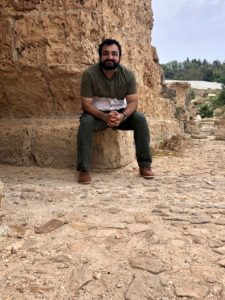Reza H. Akbari was only 16 years old when he first came to the United States. Having just emigrated from Iran with his family, Akbari spoke only Persian. In order to complete his high school degree in Buffalo, New York, he would need to learn English—fast. “I spoke no meaningful English when we first arrived here,” Akbari said. “It took about a year and half before I felt comfortable getting around.” The tragic events of September 11, which occurred not long after his arrival, only made things more difficult.

Since then, Akbari has developed a keen interest in contributing to a better understanding of political developments in the Middle East. “I have always been interested in history,” Akbari said. After obtaining a B.A. in political science from SUNY-Fredonia, Akbari came to Washington, D.C. for what was supposed to be a three-month internship at the Wilson Center. But the opportunity to conduct research alongside accomplished scholars in the nation’s capital convinced him to stay. “I saw firsthand how scholars utilize history to contextualize present times and inform their work,” Akbari recalled. “Without that context, you can misread current events.” Akbari’s internship was so stimulating that he ended up pursuing a full-time career in the D.C. policy world. Akbari has served as a Research Associate for the Iran Program at the Middle East Institute and a Research Associate at The Stimson Center. He also found time to complete an M.A. from The George Washington’s Elliot School of International Affairs, writing a thesis on the potential for political reconciliation in Bahrain.

At AU, Akbari is advised by Pedram Partovi. Under Prof. Partovi’s guidance, Akbari now hopes to study the formation, evolution, and impact of political parties in semi-authoritarian states like Iran. “Are political parties in Iran today meaningful or are they just window dressing?” Akbari wonders. “Even if they do not have much of an electoral role, they still maintain close relationships with various members of society, and vice versa. It is much more complicated than we think.” According to Akbari, the AU History Department provides an excellent environment to pursue research on this subject. “It has been such a welcoming department right from the get-go,” he says. “I love the approach to history here. The professors treat history as a very present concept, something that is still alive and informs our opinions of events today. That resonated with me right away.”